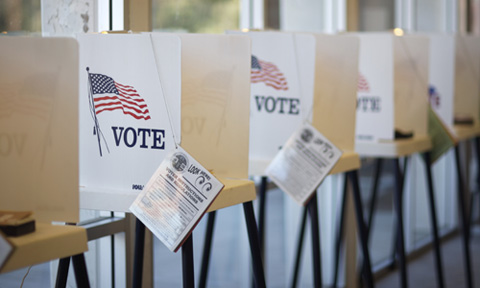From The Desk of the Pre-Law Specialist, Larry Hayman
Ohio’s election laws have fared poorly with federal courts this month. On Sept. 4, 2014, U.S. District Court Judge Peter Economus, found that there was a strong likelihood that Ohio SB 238 and Ohio Secretary of State Directive 2014-17 violated both the Fourteenth Amendment’s Equal Protection Clause and Section 2 of the Voting Rights Act of 1965. SB 238 was passed by the Ohio General Assembly and signed by the Governor. This law sought to eliminate Ohio’s “Golden Week”—the five-day period of time where voters could simultaneously register to vote and cast a ballot on the same day. Furthermore, SB 238 reduced the number of days Ohio voters were able to cast early, in-person votes from 35 down to 28 days. Ohio Secretary of State Directive 2014-17 attempted to set uniform early, in-person voting hours throughout the state. The first election cycle for which the bill and directive were to be effective was the 2014 general election, to take place on November 4, 2014. Races for Ohio’s Governor, Attorney General, Treasurer, Auditor, and General Assembly, as well as seats for the U.S. House of Representatives are to be decided on that day.
decided on that day.
Several groups in Ohio, including several churches, the NAACP and the League of Women Voters of Ohio, filed suit, alleging constitutional and federal statutory violations. Moreover, the groups claimed that the law impermissibly burdened the right of several groups—African Americans, lower income individuals, and the homeless among them—to vote. These groups are disproportionately affected by the elimination of voting activities, the plaintiffs contended.
The Court agreed with the Plaintiffs and blocked the enforcement of SB 238 and Directive 2014-17. The United States Court of Appeals for the Sixth Circuit refused to halt the decision, at least on an emergency basis, as requested by the Ohio Secretary of State. Thus, the Ohio Secretary of State has directed the boards of election to be prepared to launch early voting in accordance with the court’s order. While he continues his appeal of the District Court Judge’s decision, it seems unlikely that the rules set forth in the District Court’s order for the 2014 general election will change.
The case is NAACP v. Husted, Case No. 14-CV-3877.
In another election law decision, this one issued by United States District Court Judge Timothy Black on Sept. 11, 2014, the Court declared that Ohio’s “false-statement” laws were unconstitutional. Enacted in 1995, Ohio’s “false statement” laws made it a crime to post, publish, circulate, distribute, or otherwise disseminate a false statement concerning a candidate, either knowing the statement to be false or with reckless disregard of whether it was false or not if the statement is designed to promote the election, nomination, or defeat of the candidate. Similarly, it was a crime to make a false statement concerning the voting record of a candidate or public official. Any person could allege a violation of these statutes by filing a complaint with the Ohio Elections Commission (OEC).
During the 2010 election for the U.S. House of Representatives, an anti-abortion group had made plans to post billboards attacking a sitting House member for his vote in favor the Affordable Care Act (ACA). That billboard equated a vote for the ACA with a vote for tax-funded abortion. The House member filed a complaint with the OEC, alleging the group made a false statement. The OEC found, by a 2-1 vote, probable cause that the anti-abortion group had made a false statement. The group then filed a lawsuit in federal court, alleging that Ohio’s false statement laws violated the First Amendment. After making its way to the U.S. Supreme Court on a procedural issue, the case was decided last week by the District Court Judge. The District Court, analyzing the case under a strict scrutiny framework, struck down the statute as unconstitutional.
The case is Susan B. Anthony List v. Ohio Elections Commission, Case No. 1:10-CV-720.
Unlike the NAACP case, however, it seems unlikely that the Ohio Attorney General’s office will appeal the case in Susan B. Anthony List. Indeed, both publicly and in court filings, Ohio Attorney General Mike DeWine has expressed his view that Ohio’s false statement laws are unconstitutional. Thus, it is very likely that no appeal will be taken of the decision.
To learn more about these and related issues, a panel discussion Vote Suppression, Democratic Values, and Struggles for Voting Rights, was held Sept. 17 by The Ohio University Institute for Applied & Professional Ethics, in conjunction with the Department of Philosophy and The Center for Law, Justice & Culture.



















Comments